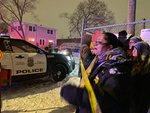
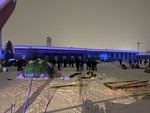
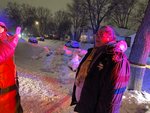
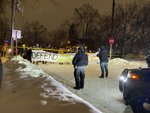
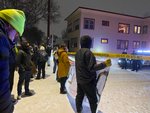
Over a hundred Minneapolis Police Officers and 50 squads shut down an eight-block radius around the Roof Depot site on Tuesday evening, Feb. 21, 2023, at about 6:15 p.m., and forcibly removed Indigenous people and allies who had began a peaceful occupation of the site that morning at dawn.
Cedar between 24th and 28th, along with sections of 26th and 28th between Hiawatha and Cedar were blocked for more than two hours. Neither residents nor press were allowed within two blocks of the site.
Note: The Longfellow Nokomis Messenger arrived at the scene by 6:20 p.m. before the entire area had been blocked off with crime scene tape, and was the only media outlet at the Roof Depot fence. View video and photographs from the scene on the Messenger website, as well as Instagram and Facebook accounts. Other media, including Unicorn Riot and NDNCollective, were prevented from viewing what was occurring at the Roof Depot site, and remained at 27th and Cedar covering the gathering of protesters that were there.
Rachel Thunder, who was arrested at the site for trespassing and released later that night, stated, “There is no trespassing on stolen land.”
At a press conference at 1 p.m. on Tuesday at Nenoocaasi Camp, Thunder said, “Minneapolis is committing environmental racism that will further the genocide of Indigenous people and community members of south Minneapolis.” Thunder is a member of the Plains Cree, part of the American Indian Movement (AIM), a Little Earth Protector, and a community member of south Minneapolis.
She read out their list of demands (also available at www.defendthedepot.com):
1) Total relocation of the Hiawatha Expansion Project
2) Hand over control of Roof Depot to the community
3) Plans to remove Bituminous Roadways and Smith Foundry
4) Enact a moratorium on encampment evictions
5) Provide funding for peer support workers
6) Invest in pilot programs to shelter and services to the houseless community like the former navigation center
7) Provide funding for the community’s vision for an indoor urban farm at the Roof Depot site
A statement from Defend the Depot pointed out that East Phillips is a neighborhood with over 70% residents of color and home to the Little Earth housing development, where 38 tribes come together.
According to a Wilder Foundation Study, Indigenous people make up 1% of Minnesota’s adult population but a disproportionate 13% of the houseless population. A survey of a large encampment in Minneapolis in 2020 found that nearly half of the 282 people living there were Native.
Mike Forcia, a member of the American Indian Movement, observed, “Feb. 27 will be the 50th anniversary of Wounded Knee, and we plan on celebrating it right here.”
He added, “We were always told to go through the process. There’s always a process. That process is a systemically racist process set up to benefit them. It’s not for us.”
The city council approved an agreement they labeled as a “compromise” in city documents, that would give three acres on the corner of the 7.5-acre property to the neighborhood for development.
“We don’t want them to bring more pollution in. That’s our main point,” stressed Little Earth resident Cassandra Holmes, who also serves on the East Phillips Neighborhood Institute (EPNI) board (www.eastphillipsneighborhoodinstitute.org) and the city’s Southside Green Zone committee.
“Do we want to convince our people just for three acres and still have them poison us? No.”
Jolene Jones agreed. “They can take their three acres and shove it because you’re talking about our children breathing. You’re talking about our children living past 25 and not having heart issues that we don’t understand where they got them. It’s our future and that is our children.”
“I myself have lost a child to environmental injustice. I have a best friend who lost a child to environmental injustice and racism. Environmental injustice and racism affects our community. It has for generations. It’s nothing new. It’s not a surprise. What is a surprise is that the city has put in place a Green Zone. They recognize we are polluted,” said Holmes. She pointed out that the Clark-Berglund Law prohibits additional pollution in the Arsenic Triangle around the Roof Depot site, which is already affected by the pollution from the Smith Foundry and Bituminous Roadways.
“We are slowly dying. We are slowly being killed,” said Holmes. “It’s affecting our kids. It’s affecting generations to come. ..."
The city plans to increase the traffic around their public works facility by another 800 vehicles, she pointed out. Most of these are diesel. The area already has high levels of asthma, lead poisoning and heart disease. Studies have shown that the pollution also gathers over South High School, affecting all of the students and staff there each day. Teenagers from Longfellow and Seward attend South High.
“Remember why you ran. You said you were all about climate change. You said you were all about green jobs, green education, green training and all this. This is going the opposite direction and we need you to do the right thing.”
View past articles under the News tab/Roof Depot.
Comments
No comments on this item Please log in to comment by clicking here